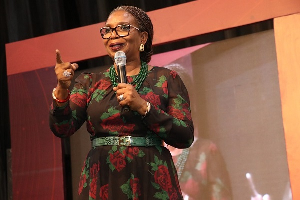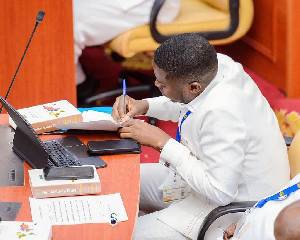Renowned Nigerian businesswoman, motivational speaker and accomplished author, Dr. Ibukun Awosika, has emphasised that the primary challenges to empowerment in Africa are economic rather than gender-based.
The leadership expert, who served as the first-ever female Chairperson of First Bank of Nigeria and has extensive experience working with organisations across the continent, shared her insights on the crucial factors impacting empowerment in Africa at the African Women Leadership Forum organised by the China Europe International Business School (CEIBS) Africa, in Accra.
She highlighted that African women have been in leadership since the pre-colonial era and early democracy days with the likes of Funmilayo Ransome-Kuti in Nigeria and Yaa Asantewaa in Ghana among others, even though men are the dominant leaders in most socio-economic settings – hence, the ability to put developmental issues in proper perspective as a limited economic resources challenge rather than gender and rebuild the structures and systems will be key to addressing those issues.
Furthermore, she emphasised that while gender inequity remains a significant issue in many African countries, the fundamental barrier to empowerment lies in economic disparities.
She noted that economic opportunities are limited for a large segment of the population, which hinders women’s ability to access financial services, higher education, be represented in the boardrooms and access other essential resources.
She mentioned that one thing men understand so well is money and numbers, so when the issues are explained well economically the people wake up – but there is a cost to it.
“African women have been leading for generations and can lead; what they did not have is enough space and opportunities to lead. Therefore, we must not be focusing on fighting for leadership but on enough space and structures or opportunities to operate.
“I say it is an economic issue because men understand the numbers, and so once you show them the numbers they are ready to listen. Men are now largely in leadership positions and the changes that need to take place will largely be driven by men.
When they see they are about to lose money or value by making women do certain things, they won’t allow that.
“Empowerment is ultimately about providing individuals with the resources, opportunities and support they need to thrive and achieve their full potential. In the African context, it is clear that economic empowerment is a critical factor in breaking the cycle of poverty and enabling individuals to lead fulfilling lives,” she said.
She mentioned that, largely, women form the majority in any pollution across the continent, and so underutilising about 55 percent of a population will always have economic consequences. “… So, when a society allows its two main genders to work together in any system, then it is protected and assured of sustainable growth – just like in the home setting,” she added.
Banking and financial services for women
She narrated that some years back, in the banking sector only men were at top management levels and the products developed for the market were universal for both men and women without any intention to undermine women; but over time when women got to the top management levels, in Nigeria for instance, they were able to draw attention to what women uniquely want – and that led to the development of products for them.
“So, it is not about men being against women’s empowerment and therefore we need to fight or compete with them; it’s economic and requires systemic solutions,” Dr. Ibukun reiterated.
“Most women do not know how to build wealth; they must at times depend on their husbands to do so, and therefore they have learnt to consume their income without planning. So, we need to be systematic and strategic about creating products for women in the banking sector and helping them grow wealth,” she added.
The first challenge is the economic and business development decisions nations must make, not gender stereotypes.
“The real fact is that on this continent of Africa, women are latent assets. They are underutilised; therefore, when society can add value by creating the right governance policies, structures and platforms to operate, more value can be created,” she noted.
Women’s emotional imbalance challenge
Dr. Ibukun urged women to deal with their emotional imbalance and learn to stand up to challenges. Most often, she said, women easily surrender when issues come up in organisations by getting emotional and then resigning from the job – instead of standing up to fight for the right thing to be done and set a precedent for the future.
“When you are a woman anywhere and policies are not right and gender-biased, fight the system and the structure. Raise support when needed, but don’t just give up and resign. We must be smart about the process of dismantling the structures and building back better ones rather than being too emotional about things,” she said.
The African Women Leadership Forum is a leader’s engagement platform created by CEIBS for African women to discuss and highlight key issues of leadership and how women are changing the narrative and driving the agenda for women to do more and sit at the decision-making table.
CEIBS values the role of women in leadership and the impact they can create in changing the narrative for development and nation-building. The forum was attended by women in leadership and entrepreneurship from all over Africa.
Business News of Monday, 15 July 2024
Source: thebftonline.com

















